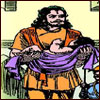The Old Hermit who exchanged his Body for that of the Dead
Boy. Why did he weep and dance?
Then the king went
back to the sissoo tree, put the Betal on his shoulder in spite of all its
writhings, and set out in silence. And the Betal on his shoulder said: "O
king of kings, you are terribly obstinate about this impossible task. So to
amuse the weary journey I will tell a story. Listen."
In the Kalinga country was a city called Shobhavatu,
where people lived as happily as in heaven. There ruled a famous king named
Pradyumna. And in a part of this city was a region set apart by the king, where
many Brahmans lived. Among them was a learned, wealthy, pious, hospitable
Brahman named Yajnasoma.
In his old age a
single son was born to him and his worthy wife. The boy grew under the
fostering care of his father, and showed signs of excellence. He was called
Devasoma by his father, and his parents were entirely devoted to him.
In his sixteenth
year the boy attracted everyone by his learning and modesty. Then he suddenly
fell ill of a fever and died. When his father and mother saw that he was really
dead, they embraced the body and wept aloud. But their love for him would not permit
them to burn the body.
So the old
relatives gathered, and said to the father: "Brahman, life is imaginary
like a city in the sky. Do you not know this, you who know things above and
things below? The kings who enjoyed themselves like gods upon the earth, they
have gone one by one to cemeteries filled with processions of weeping ghosts.
Their bodies were burned by the flesh-devouring fire and eaten by jackals. No
one could prevent it in their case. How much less in the case of others?
Therefore, as you are a wise man, tell us what you mean by embracing this dead
body?"
So at last the
relatives persuaded him to let his son go, and they put the body in a litter
and brought it to the cemetery with weeping and wailing.
At that time a
hermit was fulfilling a hard vow, and was living in a hut in the cemetery. He
was very thin because of his age and his hard life. His veins stuck out like
cords to bind him, as if afraid that he would break in pieces. His hair was
tawny like the lightning.
This hermit heard
the wailing of the people, and turned to his pupil who begged food for him. Now
this pupil was proud and arrogant. And the hermit said: "My boy, what is
this wailing we hear? Go outside and find out, then return and tell me why this
unheard-of commotion is taking place."
But the pupil
said: "I will not go. Go yourself. My hour for begging is passing
by."
Then the teacher
said: "Fool! Glutton! What do you mean by your hour for begging? Only one
half of the first watch of the day is gone."
Then the bad pupil
became angry and said: "Decrepit old man! I am not your pupil. And you are
not my teacher. I am going away. Do your begging yourself." And he angrily
threw down his staff and bowl before the old man, and got up, and went away.
Then the hermit
laughed. He left his hut and went to the place where the dead
Brahman boy had
been brought to be burned. He saw how the people mourned over such youthful
freshness dead, and felt his own age and weakness. So he made up his mind to
exchange his body for the other by magic.
He went aside and
wept at the top of his voice. Then he danced with all the proper gestures.
After that, full
of the longing to enjoy the happiness of youth, he left his own withered body
by magic and entered the body of the Brahman youth. So the Brahman youth came
to life on the funeral pyre and stood up. And a cry of joy arose from all the
relatives: "See! The boy is alive! He is alive!"
Then the magician
in the body of the Brahman boy said to the relatives: "I went to the other
world, and Shiva gave me life and directed me to perform a great vow. So now I
am going off to perform the vow. If I do not, my life will not last. Do you
then go home, and I will come later."
So he spoke to
those gathered there, having made up his mind what to do, and sent them home
full of joy and grief. He went himself and threw his old body into a pit, and
then went off, a young man.
When the Betal had told this story, he
said to King Trivikrama, who was walking through the night: "O King, when
the magician entered another person's body, why did he weep before doing it, or
why did he dance? I have a great curiosity about this point."
And the king was
afraid of the curse, so he broke silence and said: "Listen, Betal. He
thought: I am leaving to-day this body with which I won magic powers, the body
which my parents petted when I was a child.' So first he wept from grief, and
from love of his
body which he found it hard to leave. Then he thought: With a
new body I can learn more magic.' So he danced from joy at getting youth."
When the Betal
heard this answer, he returned quickly to the sissoo tree. And the king pursued
him, undismayed.
To be continued...




No comments:
Post a Comment